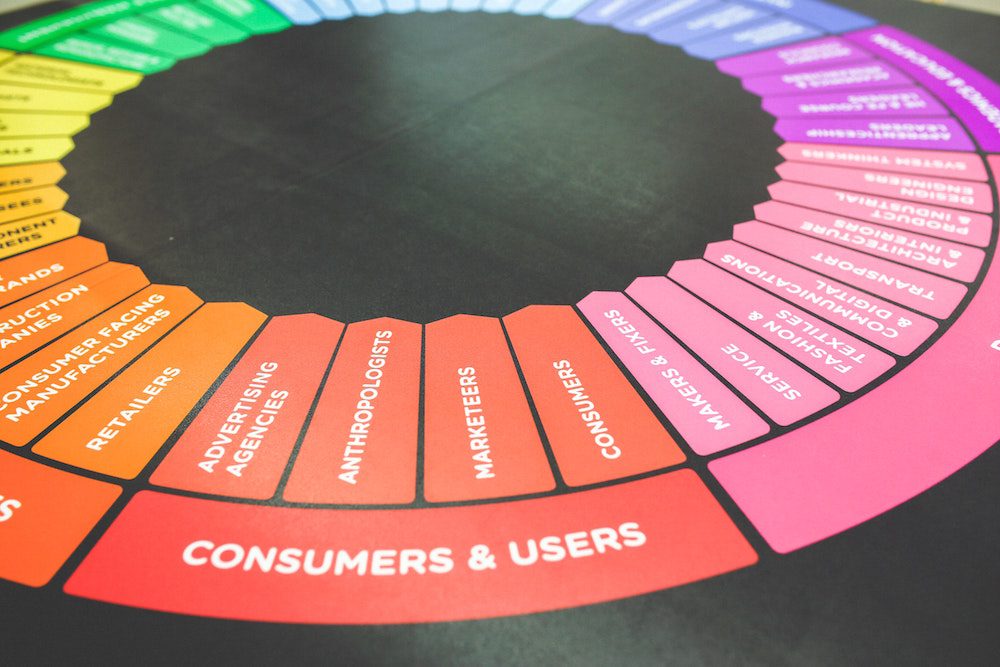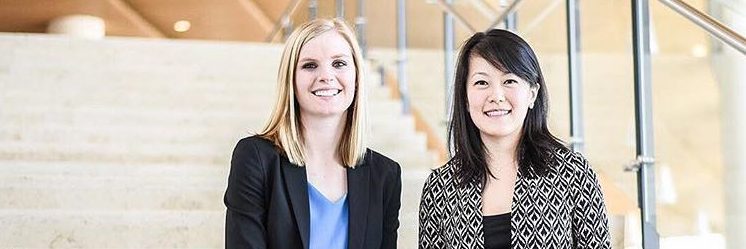The 5 Highest Paying Marketing Jobs for MBAs

Marketing is one of the most popular career paths for an MBA—2.9 times as popular as other careers according to PayScale—and with good reason: about 69 percent of marketing MBAs report a high level of job satisfaction. Besides, marketing MBAs are paid well. While the starting median pay (with a max of five years of experience) is only $55,700, after ten years, pay jumps to $116,000—a 108 percent growth between starting and mid-career salary.
The question then is, “What are the highest paying marketing jobs for MBAs?” The answer isn’t as cut and dry as you would think. It varies significantly between companies, level of experience, location, and job type.
Companies Recruiting Marketing MBAs
Where you work can have as a profound of an impact on your pay as your actual job function. That’s because larger companies tend to pay higher salaries, and how a particular company views the marketing department can also influence how much they are willing to pay. Below are five of the highest paying marketing jobs, according to PayScale.
- Microsoft Corp: $95,146 – $152,605
- IBM Corp: $91,158 – $132,500
- Dell, Inc: $77,511 – $130,000
- Starbucks Corp: $115,436 – $121,097
- Amazon: $90,000 – $122,500
Experience
According to PayScale, experience plays a big role in how much you earn as a marketing professional. After graduating with an MBA in business and marketing, the average salary you can expect based on your years worked is:
- Less than one year: $54,721
- One to four years: $59,343
- Five to nine years: $81,097
- Ten to 19 years: $104,070
- Over 20 years: $124,631
Location
Where you work, can have a significant impact on what you’re worth. As always, large cities tend to pay more, but that’s still not always a guarantee. So, where are the most popular cities for marketing professionals and how much do they pay (average salary)?
- Seattle, WA: $119,266
- San Francisco, CA: $118,330
- Boston, MA: $104,217
- Dallas, TX: $100,237
- NYC, NY: $96,387

The Top MBA Marketing Jobs
There are dozens of different marketing positions that an MBA graduate can choose. If you’re looking to choose the highest paying marketing job, then you’ll want to choose one of the following five jobs. These are the top salaried positions for marketing MBAs (just be sure to keep in mind the company, location, and your experience if you want to earn the most money).
-
Vice President Marketing ($100,000 – $186,000)
As a Vice President of Marketing, you will offten be responsible for reporting your company’s marketing efforts to the board of directors or other highly-placed executives. Your main responsibility will be to determine the best strategies to improve your market-shares for goods and services sold. You’ll also be responsible for your company’s brand, including presenting the company’s assets and products. Common tasks include:
- Forecasting and strategic planning.
- Directing and setting the strategic direction of the marketing program.
- Overseeing all marketing staff operations, policies, and plans.
For MBA graduates, becoming a VP of Marketing is the highest paying position you can attain. On average, you’ll earn $143,571 plus a bonus between $4,939 and $49,935. As for where you’ll get paid the most, look for jobs in:
- San Francisco: 21 percent more
- Charlotte: 11 percent more
- Boston: 10 percent more
-
Marketing Director ($66,000 – $158,000)
Marketing Directors are responsible for managing and directing all marketing tasks. You’ll oversee the many marketing professionals under your purview and ensure that they meet company goals, requirements, and needs. In addition, you’ll be responsible for developing marketing projects, running successful marketing campaigns, monitoring budgets, resolving team issues, and communicating with clients, vendors, and other team managers within your company. Common tasks include:
- Overseeing marketing staff, advertising budget, and business planning.
- Directing and planning marketing strategies.
- Acting as the marketing subject matter expert.
On average, a Marketing Director with an MBA can expect to earn $106,684. However, that salary can greatly increase depending on the company you work for. The top companies are:
- Medtronic, Inc: $175,000
- Microsoft: $164,848
- IBM: $147,215
-
Senior Marketing Manager ($73,000 – $147,000)
As a Senior Marketing Manager, you’re in a middle-management position. Typically, you report to the Marketing Director and are responsible for researching target markets, providing feedback on product development, running product teams, planning display marketing, and working with various other teams to develop marketing objectives and goals. Common tasks include:
- Managing training and development of marketing staff.
- Managing and analyzing marketing programs for optimized results.
- Developing, recommending, and implementing marketing programs and campaigns.
On average, you can expect to earn $111,476. To earn the most, you’ll want to look at jobs at:
- Microsoft: $138,598
- Medtronic, Inc: $128,104
- Amazon.com: $126,774
-
Brand Manager ($68,000 – $132,000)
As a Brand Manager, you’ll be responsible for many of the customer-facing operations in the marketing department. Your job will be to control and manage all the ways that the company is exposed to the public including consumer attitudes, staff communication, and more. Common tasks include:
- Leading the brand strategy.
- Researching customer attitudes and developing plans and projects to support positive experiences.
- Leading consumer communication in each marketplace.
On average, a Brand Manager earns $102,309 as an MBA graduate with a yearly bonus between $795 and $19,644. To earn the most money, you’ll want to work in:
- San Francisco: 41 percent more
- Seattle: 36 percent more
- Chicago: 16 percent more
-
Product Marketing Manager ($60,000 – $130,000)
A Product Marketing Manager knows the company’s products inside and out. They are responsible for conducting research and determining a strategy for selling each product to generate the highest revenues. You’ll also be responsible for overseeing how each product is seen by the public from advertising to press releases and more. Common tasks include:
- Developing product marketing strategies to maximize revenue.
- Researching consumer opinions on products to aid performance.
- Collaborating with design to meet consumer expectations.
On average, a Product Marketing Manager will earn $105,942, which is pretty consistent between companies. The best paying companies are:
- Google: $115,723
- Microsoft: $115,481
- AT&T: $112,020
Harvard Faculty Discuss Recent Chinese Tariffs, and More – Boston News

Let’s explore some of the most interesting stories that have emerged from Boston business schools this week.
Trade War or War of Words? – Harvard Business School Blog
Following the Trump administration’s recent announcement of 25 percent tariffs on 1,000 Chinese exports, Bill Kirby and Willy Shih, Harvard Business School faculty experts on China, took to the HBS blog to “trade theories on the best path forward for the world’s two largest economies.”
Both experts point to economic shifts in the 1980s, which, not incidentally, was the decade in which Donald Trump started to become a household name. Kirby notes that the major trade distinctions between the United States and Japan, specifically regarding the auto-manufacturing industry, set a precedent. In that, the United States began to firmly invest in Japanese car companies like Honda and Toyota, building their own domestic manufacturing plants. Kirby suspects, however, that the Trump administration may not be as open to that kind of investment. “If Chinese companies wanted to improve access to American markets by investing in the US, would the administration be open to it?” he asks. “They ought to be, in my view. But my suspicion is that that’s not the outcome that this administration is looking for. They’re looking for a miraculous recovery of American-based manufacturing exporting to a Chinese market, not a particularly good match.”
Shih, staying on the topic of the ’80s, offers a different opinion, saying; “I think the real issue is industrial policy on the Chinese side competing with a lack of industrial policy on the U.S. side and the consequences of that. Going back to the mid-1980s, the Chinese government has been mapping a pathway for the country to become a modern country (just as the Koreans, Taiwanese, and the Japanese did before, except on a much larger scale). The Chinese have identified core capabilities that they want to see inside the country, and they’ve been methodically working on that over the last 30-plus years. I’d argue the positive trade balance with the US reflects the progress they’ve made.”
You can read the full conversation between Kirby and Shih here.
An Easy Internship Trick from Kayla Humel ’18 – Simmons Blog
Current Simmons School of Management student body president Kayla Humel, ’18, wrote candidly about the impact of the Student Government Association (SGA) on her recent internship at Puma and future career plans.
“First and foremost, [SGA has taught me] the power of good communication. When the e-board is communicating with one another, event planning is exponentially easier. When SGA is communicating with organizations, processes like budgets occur seamlessly. Good communication is crucial to success in any organization.”
Humel threw her hat in the presidential race because she “saw opportunities to improve processes between SGA and the other organizations on campus. I knew that SGA could create change on campus and I wanted to play a major part in that.”
You ca check out more about her Simmons experience here and watch an interview with Humel about her internship below.
Wield Polarization to Build Positive Change – MIT Sloan Newsroom
MIT Sloan School of Management sustainability initiative director Jason Jay used his recent TEDx talk as an opportunity to share some strategic advice on how to more effectively spark difficult conversations. “The voltage feels so high that we simply avoid conversations out of fear of getting shocked. But I like to think about that polarization as a kind of energy.”
- Draw a contrast between what others might expect you to do and what you’re really trying to do.
- Clarify the values underlying your positions, and do the same with the people you’re talking to.
- Make it clear that you aren’t meeting simply to bargain over these values, but to embrace tension and find new ideas.”
You can check out Jay’s TEDx talk at Hofstra University below and learn more about his work here.
MBA Battle: BU Questrom v. BC Carroll

Boston College and Boston University are two of the metro’s most popular and recognizable schools. But for two schools with a lot in common, BU and BC don’t seem to like each other much. Continue reading…
Where Toys R Us Went Wrong, Sawyer International Business Etiquette, and More – Boston News

Let’s explore some of the most interesting stories that have emerged from Boston business schools this week.
Here’s What Sunk Toys R Us – MIT Sloan Newsroom
Experts from MIT Sloan offered a few choice insights into what Toys “R” Us, whose future currently remains in flux, could learn from the hiccups along its 70 year-long history.
Senior lecturer in work and organization studies Peter Kurzina writes that Toys “R” Us “ignored Amazon eating their lunch, thus failed to prepare and meet the challenge of competition.”
Associate professor of finance Andrey Malenko, a fellow MIT Sloan colleague, also critiqued the toy giant’s enormous debt burden. “If you’re running a business that might be sensitive to e-commerce, to the recession, then loading up on debt as much as [Toys “R” Us] did, it’s very risky and you probably shouldn’t do it.”

In March 2018, Toys “R” Us announced it would be closing all US and UK locations.
Read more of the duo’s analysis here.
International Business Basics – Sawyer Business Blog
The act of doing business across cultures often entails unexpected byproducts that Sawyer addressed in its recent “Business Protocol Across the Globe” forum, organized by Colombian native Laura Reales, BSBA ‘18.
“What if I wanted to move to another part of the world, like Saudi Arabia or France or China? How could I make connections with people so that I don’t look ignorant of their culture? So I decided to create a space where it was ok to talk about those differences.”
Read here to learn the answers to questions like, “What’s the proper way to present a business card in China?” and “What’s a good way to begin a negotiation in Turkey?”
Alumnus’ Company serves the Housing Needs of a Vulnerable Community – D’Amore-McKim Blog
The Northeastern University D’Amore-McKim School of Business profiled alum Andy Rosenthal, a 2007 alum who abandoned a lucrative career in hedge fund software to co-found the Terenbinth Group, which has become the “largest, family-owned provider of housing to people with intellectual and developmental disabilities.” Rosenthal explains his company’s model.
“We’re a real estate company focused on providing quality, safe, affordable housing to a vulnerable community,” Rosethal said in the interview. “In short, we find homes, fix them up, customize them to suit the tenants—think wheelchair accessibility, replacing door knobs with door levers, waterproof flooring, installing roll-in showers, etc.—and then rent them directly to the individuals.”
The company’s 68 homes currently accommodate more than 225 people across the state of Indiana and it’s looking to expand. You can learn more about the Terebinth Group’s plans here.
What are the Best Real Estate MBAs in Boston? – MetroMBA
Earlier this week we highlighted the three strongest Boston metro schools that can help you earn your way into the real estate industry: Harvard Business School, MIT Sloan, and the Babson College F.W. Olin Graduate School of Business.
Regarding Babson, writer Jillan Markowitz writes:
“At Babson College’s F.W. Olin Graduate School of Business, MBA students can pursue the finance concentration, which offers several courses in real estate. Students can rake courses like Real Estate Financial Modeling, Real Estate Fundamentals, or Real Estate Development. According to recent Olin graduate employment statistics, 10 percent of the 2017 MBA class landed jobs in real estate. This number may not seem overwhelming, but it dwarfs the percentage seen in many MBA programs (usually about two to three percent).”
Learn more about the best real estate programs in Boston here.
Learning from MIT Sloan’s First All-Female Senate Leadership Team

Women in leadership positions are still relatively rare. According to the latest report from MSCI, a research and analytics firm that helps leading investors build and manage portfolios, it could likely be 2027 before women fill just 30 percent of directorships in publicly held companies. Currently, they only hold 18.1 percent of such posts. But despite these discouragingly low numbers, significant progress is being made in other arenas. Recognizing and encouraging progress toward greater gender equity in business and in business school is extremely important if we want to help foster even more.
Fortunately, we need look no further than MIT Sloan School of Management to find clear signs of progress. During its most recent Senate election, two women were named co-presidents, marking the first time in the school’s history that its student government can claim an all-female top leadership team.
Avery Beach and Jennifer Zheng ran for co-presidents as a way to give back to MIT Sloan, a program that they said “has changed our lives.” They went on to explain, “Each of us felt strongly about the school’s potential and thought we could contribute to making it even better. We also believe that representation is extremely important. By running for co-president, we hope that we’ve inspired others, including underrepresented voices, to take on future leadership roles and continue Sloan’s mission to improve the world.”
Both women feel that it has been an extremely valuable opportunity to serve as the school’s first all-female Senate leadership team. In these roles, they have had a chance not only to develop their leadership skill set, but also to expand their network and impact their community.
“Our role as student leaders involves understanding how to influence key stakeholders, managing an organization of 60 students, and making frequent public speaking appearances,” explained Beach and Zheng. “We have learned and grown through this experience in an environment where it is okay to make mistakes. These failures and successes have made us better leaders, and this experience will translate into our work after school.”

Avery Beach and Jennifer Zheng
Serving as co-presidents of the Sloan Senate has been important to both women personally, but the experience has also convinced Beach and Zheng that it its important for other women, particularly female MBA students, to take on leadership roles within their programs and schools.
“Women are often underrepresented at the top of the career ladder,” they said. “By leading early and regularly, women can stand out in the current job market as well as in their future careers, such as during promotions. We hope that women continue to strive for these experiences.”
In the end, Beach and Zheng have felt empowered by their positions as Senate leaders and hope other women will feel the same. “As we look to the legacy we’ve left at the school, we hope to be remembered not only as effective female leaders, but as effective leaders—that is what will make a difference,” they said.
This article has been edited and republished with permissions from our sister site, Clear Admit.
Sawyer Announces High School Summer Program, US News Rankings and More – Boston News

Let’s explore some of the most interesting stories that have emerged from Boston business schools this week.
New Summer Program for High School Juniors and Seniors – Sawyer Business Blog
The Suffolk University Sawyer Business School recently announced the launch of its Stepping Stone program, which gives 11th and 12th-graders the opportunity to study with faculty, work in Sawyer’s Trading Room, Center for Entrepreneurship, or Innovation Lab, work on projects or visits to companies.
Sawyer’s director of honors programs Kim Larkin writes:
“This is a great opportunity for high school students to study at one of the area’s top business schools. Whether they’re interested in finance, international business, leadership, sports marketing, or entrepreneurship, students will discover the program is a great first step into the world of business and a wonderful way to experience campus life before they go to college.”
The program is slated to run July 9-20, 2018.
Learn more about the program here.
MIT Sloan Tops U.S. News List for Production/Operations, Information Systems – MIT Sloan Newsroom
The MIT Sloan School of Management revealed its impressive showings in last week’s U.S. News & World Report 2019 graduate school rankings. The school, which made its usual top five appearance among full-time MBA programs, came out on top in the production/operations and information systems MBA specialties.
MIT Sloan maintained its “respective second and third place rankings for supply chain/logistics and entrepreneurship specialties.” In addition, Sloan boasted an outstanding average starting salary of $148,000 for its 2017 MBA class, as well as one of the highest post-graduation employment rates at over 84 percent.
Read more about Sloan’s U.S. News accolades here.
Carroll School Surges to #25 in New Part-Time MBA Rankings – Carroll School of Management Blog
It was clearly a good week for Boston MBAs in the rankings last week as U.S. News & World Report ranked BC’s Carroll School of Management’s part-time MBA 25th—an unprecedented 21-spot climb from last year—and 48th on the full-time MBA list.
Andy Boynton, the John and Linda Powers Family Dean at Carroll, explains that the school’s online course offerings and “increased focus on part-time MBA students has led to substantial curricular changes, including a stronger emphasis on skills such as data analytics, which are heavily in demand by employers. We’re building a program around the needs of these students, with much greater flexibility in our offerings.”
Learn more about Carroll’s part-time MBA here.
